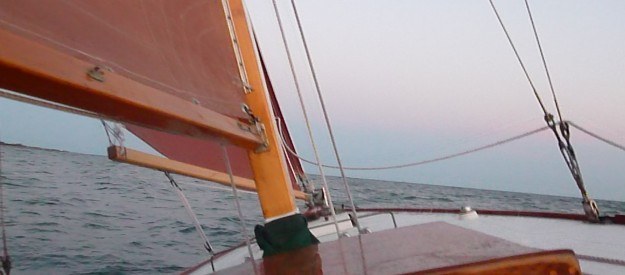"We are losing our attitude of wonder, of contemplation, of listening to creation and thus we no longer manage to interpret within it what Benedict XVI calls 'the rhythm of the love-story between God and man.'"
+ Pope Francis
Life on the open seas: community, government, and the Gospel

Last August, I wrote about a six-hour sail that gave new perspectives on life, faith, and the Catholic understanding of ecology. A few weeks ago, another outing on the Able—the sturdy sloop owned by my friend David, a navigational instructor at the Navy base—gave me more to think about.
Last year’s voyage took me north under the
But the Able sailed well and I valued anew the meaning of cooperation and community, whether it’s just two friends at sea or larger groups that benefit by both those who set the course and those who keep it.
In my 23 years as an environmental regulator, I’ve worked with many communities. And as my writings on Catholic ecology reach a national audience, I have joined and championed even more. But just before I drove down to board the Able, a few anonymous posters in the National Catholic Reporterlevied harsh criticism against me for a view I expressed about communities. These posters were unhappy because I wrote that polluters, being human beings, are like you and me: made in the image and likeness of God and in need of salvation.
Their objections stemmed from writing I had done on thedangers of hydraulic “fracking” for natural gas. Fracking is a largely unregulated industrial process and it’s creating havoc in places like
But lately, forgiving communities—like healthy ecosystems—are difficult to find. Our growing atheistic and secular world encourages deep mistrust and creates ideological and social schisms that degrade our world, our planet, our nation, our neighborhoods, our families, and ourselves. As Pope Benedict XVI has taught, current and looming global ecological (and economic) crises are at their core global symptoms of godlessness and sin—the antidote to which is never isolation, but the self-sacrificial love of authentic communities.
In his new book “How to Think Seriously About the Planet,” English writer and philosopher Roger Scruton makes a similar case for the ecological benefits of local solutions to global problems. But his proposals, while compelling, are built on the sands of political philosophies and anecdotes. Faith is absent in Scruton’s analysis, which leaves one wanting more.
This came to mind as I steered the Able around
This made me wonder: In a world that seeks solutions without God, that demands a “separation of church and state,” and that increasingly seeks vengeance over true justice, should a Catholic government official allow his or her conscience to be informed by their faith?
The answer became evident as the Able approached her mooring and the lights of downtown


















